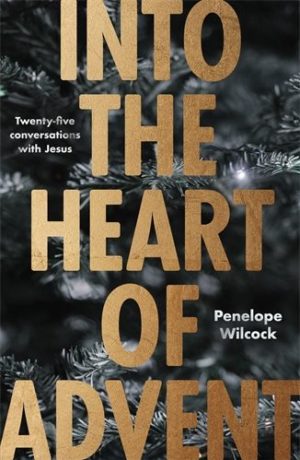



Add to your altar a picture of the baby Jesus, with a note saying, “Where life in all its need and vulnerability cries in the night, there Christ has come to me, and calls me.”
In her book Into the Heart of Advent, Penelope Wilcock takes us on a journey through the themes of Advent by a series of imagined conversations with Jesus.
Advent is the time when we think about the ways Jesus comes to us and in found among us — both as our Judge enthroned in power on the Last Day, as as the baby in the manger at the first Christmas. The Incarnation — God present with us in Jesus – is an exploration into the relationship between the particular and the universal, the limitless and eternal mystery that expresses itself in myriad ways through the ordinary detail of daily life.
We encounter the presence of God at the bus stop, the kitchen sink, the fireside, in cafés, in one another, in the carrying out of daily chores. What is routine and domestic can be the pathway into mystical experience. George Herbert wrote about this is his well-known hymn (originally called The Elixir and from his collection The Temple), Teach me, my God and King, / In all things Thee to see. In the third verse he says:
A man that looks on glass
On it may stay his eye
Or if he pleaseth, through it passe
And then the heaven espie.
He sees this — the ability to encounter God in the simple detail of daily life — as the touchstone, the alchemist’s stone that can turn base metal into gold. It is transformative and expansive, enlarging the compass of mortal life to embrace heaven. This is one aspect of Incarnation, that the human and ordinary becomes the host of the holy. In this way our pilgrimage leads us home.
The other aspect (or direction of travel) of Incarnation is God coming to find us where we are lost and astray, beyond seeking anything, let alone finding it. This is beautifully expressed in another hymn, They all were looking for a king, by the 19th century writer George MacDonald (whose work C.S.Lewis so admired). The last stanza says:
My fancied ways why shouldn’t thou heed?
Thou com’st down thine own secret stair;
Com’st down to answer all my need,
Yea, every bygone prayer.
With this wonderful image of descending the “secret stair” — perhaps the little back staircase used by the servants — MacDonald captures the sense of narrowing and enclosing in the great God of heaven coming down to be with us in our humanity.
The first letter of John puts it like this:
The true light that gives light to everyone was coming into the world. He was in the world, and though the world was made through him, the world did not recognise him. He came to that which was his own, but his own did not receive him. Yet to all who did receive him, to those who believed in his name, he gave the right to become children of God – children born not of natural descent, nor of human decision or a husband’s will, but born of God.
1 John 1:9-14 NIVUK
The Word became flesh and made his dwelling among us. We have seen his glory, the glory of the one and only Son, who came from the Father, full of grace and truth.
And we read in Philippians:
For the divine nature was his from the first; yet he did not think to snatch at equality with God, but made himself nothing, assuming the nature of a slave.
Philippians 2:6-7 Katapi NSB
Faith and imagination are very strongly connected; we have to exercise our imagination to enter living faith, and to progress along the path of that faith. Our imagination allows us to make change by immersing ourselves in the state of being we have not yet attained. Into the Heart of Advent offers the reader one way of doing this — using our imagination to make the presence of Christ with us feel as real as it in fact is.
Into the Heart of Advent explores the theme of Incarnation (God who is with us and within us), especially in chapters 3, 6, 9, 11, 16 and 17 — as follows:
Ch.3, What it means to be with us, wonders in what real sense God is present in the sufferings of torture, disease and the frailty of old age, exploring into the unity of all life and proposing that the way to make sense of it all is a path travelling not out from here but inward. Incarnation means the key to unlocking mystery is inside us..
Ch.6, Vulnerability, is about living with mental health challenges, and the companionship of Jesus that gives us the strength and support to accept our own vulnerability.
Ch. 9, Singing, a conversation about carol-singing at the supermarket, expands into a consideration about the harmonic resonance of all life!
Ch. 11, Frost, is about refugees and homeless people facing the winter cold. Exploring into the twin themes of exile and exodus, it considers the hospitality of God that sets people free as well as welcoming them home.
Ch.16, Children and babies, looks at the turbulent experience of trying to integrate real children into Sunday worship at church — including our own inner child.
Ch. 17, Gifts and graces, explores one aspect of Isaiah’s “treasures of darkness” in a consideration of the often unappreciated gifts neurologically atypical individuals bring to the faith community.
Reading these chapters in advance may help your home group prepare.
Lord Jesus, I invite you to make my heart your home. In all that you are — as my brother, my redeemer, my healer, my judge, my king — I invite you to be the Lord of my life. All that I am and all that I call mine, I open to you and lay at your feet. Speak through me, reign in me, save me, transform me, I pray. Forgive my sins and heal my wounds; let me make a new beginning with you. Set my feet on the new and living way that you have opened between earth and heaven. May I walk with you every day of my life on this earth, and come home to be with you forever when my journey is done. I ask it for your Name’s sake: Amen.